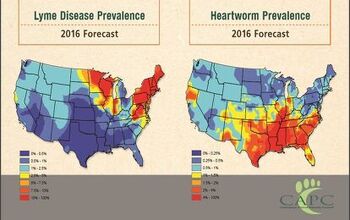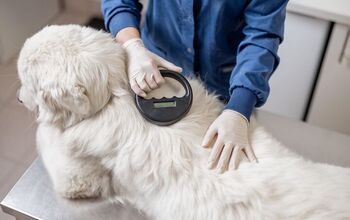The Buzz About How Mosquitoes Can Sabotage Your Dog’s Health

If you are like many dog owners, you may be under the impression that your dog’s fur coat protects him from mosquitoes. While this may be true to a certain degree, mosquitoes can still be harmful to dogs. Not only can mosquito bites cause irritation and possibly allergic reactions, but mosquitoes can also transmit dangerous diseases to your pet. Let’s talk about the basics regarding how mosquitoes can potentially harm your dog and what you can do to protect him.
Diseases Carried by Mosquitoes
You may already be familiar with some of the diseases that mosquitoes carry which can affect humans – these include West Nile virus, Eastern equine encephalitis (EEE) and systemic lupus erythematosus. Perhaps the most dangerous threat to your dog, however, is heartworm. Heartworm is a dangerous disease that can only be transmitted to dogs through mosquitoes. As larvae, these microscopic organisms work their way through your dog’s blood stream into the right ventricle of his heart where they grow into adults and reproduce. A heartworm infestation may not produce any outward symptoms, but it has the potential to kill your dog.
Related: Naturally Safe Mosquito Repellent For Dogs
How to Tell if a Mosquito Has Bitten Your Dog
It is unlikely that you spend every waking minute of your day with your dog, so it is possible that he will be bitten by a mosquito during a time when you are not around. In cases like this, it is important to be able to identify the signs of a mosquito bite. The first sign your dog is likely to indicate after being bitten is scratching – though it can be difficult, you should discourage your dog from scratching the bite because it could lead to further irritation or infection of the skin. The next symptom is swelling – in dogs that have an allergic reaction, this swelling can be so severe that it may impact your dog’s breathing or vision. In most cases, however, the irritation will be minor, appearing in the form of a bump at the site of the bite.
Note: The symptoms of heartworm infestation vary from the signs of a mosquito bite and they may take weeks to develop. Symptoms of heartworm include coughing, labored breathing, vomiting, weight loss, exercise intolerance and fatigue. If your dog exhibits these symptoms you should have him checked by a veterinarian as soon as possible.
Related: How Do Dogs Get Heartworm?
Treating Mosquito Bites in Dogs
The first step in treating a mosquito bite in your dog is to keep your dog from scratching it and making the bite worse – scratching may increase the risk for infection and the spread of disease. Wash the affected area with a mild soap and warm water then apply a topical antibacterial cream. If the bite gets worse or does not improve over the next few days, take your dog to the vet for an examination. At this time the vet may perform a blood test to check for heartworm in addition to treating the bite itself.
Protecting Your Dog from Mosquitoes
The simplest way to protect your dog from mosquitoes is to reduce the number of mosquitoes on and around your property. You can do this by removing bodies of standing water such as puddles, clogged gutters and ornamental bird baths. Mosquitoes only reproduce by laying eggs in stagnant water, so if none is available on your property then the mosquitoes will travel elsewhere. You can also apply a topical mosquito repellant to your dog’s coat to protect him when he is outside. Avoid commercial products because they are often laced with chemicals that can do more harm than good. A simple, natural option is lemon juice – simply rub it into your dog’s coat for natural protection from mosquitoes.
In addition to protecting your dog from mosquitoes, you should also give him a monthly heartworm preventive. Before you start your dog on the preventive your vet will want to perform a heartworm screening, but after that you simply have to give your dog a monthly pill to prevent heartworm infestations. Protecting your dog from mosquitoes (and the diseases they carry) is easy, so stop them before they start to bite.

Kate Barrington is the loving owner of two cats (Bagel and Munchkin) and a noisy herd of guinea pigs. Having grown up with golden retrievers, Kate has a great deal of experience with dogs but labels herself a lover of all pets. Having received a Bachelor's degree in English, Kate has combined her love for pets and her passion for writing to create her own freelance writing business, specializing in the pet niche.
More by Kate Barrington























